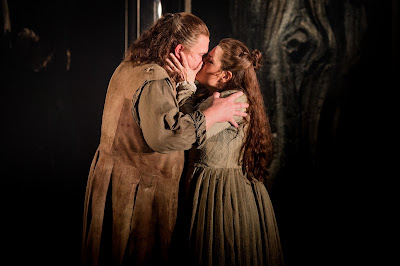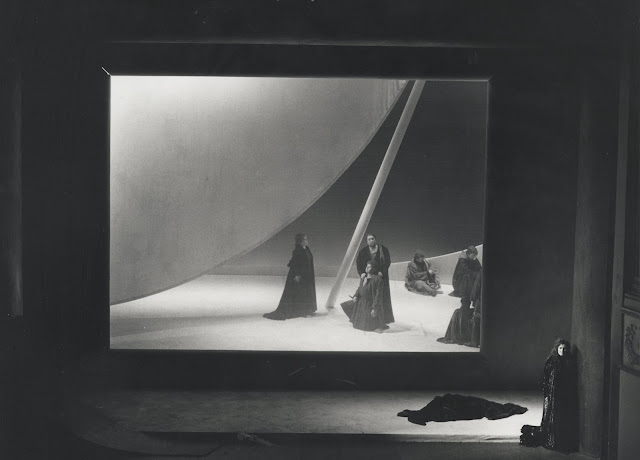 |
| Claire Rutter (Sieglinde) in Wagner's Die Walküre at Grange Park Opera (photo Robert Workman) |
Claire admits that she will now put some of her lighter coloratura roles away, as she finds that she now enjoys singing other things more. Also, as singers get older the voice and the muscles change and the voice's centre of gravity can get lower. There are of course roles which can still be sung by a heavier voice, such as Elvira in Verdi's Ernani.
 |
| Dame Anne Evans as Brünnhilde in Die Walküre at WNO in 1984 (Photo Clive Barda) |
Claire has not sung much German repertoire in recent years, but whilst she was at the Guildhall School she sang at lot of lieder and sang Wagner's Wesendonck Lieder for her final recital. She had it in her mind that she would sing Wagner one day, but it just happened that she never had the opportunity. There is also the problem that opera companies get used to a singer in a particular repertory and cannot see them in anything else. In fact Claire sang her first major French role this season when she was Lia in Debussy's L'enfant prodigue with Scottish Opera.
Just as Claire came to study Sieglinde with Dame Anne, many other singers come to her as Dame Anne loves working with young singers on repertoire which she knows well and feels that it is important to pass things on. She adds that if distinguished older singers don't do this, then the younger ones will lose the style. Claire adds that she studied the role of Violetta with Ileana Cotrubas (herself a famous Violetta, Dame Anne describes Cotrubas' portrayal as so human). Cotrubas was famously a rather tricky person to be coached by, but Claire learned a lot about colour and passion, as well as not singing loudly. Claire also had coaching with Rita Hunter in the 1990s, and of course Hunter was singing Brünnhilde in The Ring at the London Coliseum when Dame Anne was singing smaller roles (and singing Violetta in La Traviata at the same time).
The Goodall Ring at English National Opera (with Rita Hunter as Brünnhilde and Alberto Remedio as Siegfried) was cast from the strength of the company, with few guest artists, something which would not be possible nowadays. But Dame Anne also comments that they were lucky that the repetiteurs at the company were also wonderfully experienced.
Dame Anne is a trustee of the Countess of Munster trust which provides support for young singes, and she hears a lot of young singers whom she feels should be under contract with a UK opera company. She also points out that audiences like to make their own stars, they come to see young singers in smaller roles and follow them, looking forward to their next major role. When Dame Anne was young she used to receive a lot of letters from audience members who enjoyed one of her roles and looked forward to seeing her in the next one. Nowadays it is unfortunate that some young singers fail to take a particular training route because of the sheer expense.
 |
| Bryan Register (Siegmund), Claire Rutter (Sieglinde) in Wagner's Die Walküre at Grange Park Opera (photo Robert Workman) |
One problem with modern performances is that there is often never really enough rehearsal. When Dame Anne performed Brünnhilde at Bayreuth in the Ring Cycle directed by Harry Kupfer, she spent two months of each year at Bayreuth. Not surprisingly the personen regie was outstanding. But with a reduction in the amount of rehearsal conductors often expect a singer to use full voice all the time. Dame Anne was advised by Ruth Packer to watch how full she sang as 'a singer only has so many top C's in a lifetime'. Ileana Cotrubas advised Claire not to sing unless she was being paid to sing, (i.e. to mark in rehearsals); advice it would be great to take, but Claire does sing out sometimes, as it would be very frustrating for conductors and colleagues, though she is careful not to keep singing out all day every day in rehearsal, especially in heavy repertoire. .
Dame Anne feels that orchestras are playing louder and louder; she always tells young singers that, whatever they do not to try and compete with the orchestra. Claire adds that if you really sing up then the musicians assume that you can cope and do not play down. Dame Anne points out that in the pre-war period strings used gut strings rather than metal, which makes a bit difference to the sound. She heard the 2004 Proms period instrument performance of Wagner's Das Rheingold (when Simon Rattle conducted the Orchestra of the Age of Enlightenment) on the radio and was impressed with the warmth and beauty of the sound.
 |
| Act One of Tristan und Isolde at WNO in 1993 (Photo credit Clive Barda) |
Wagner Die Walkure - Bayreuth Festival, Anne Evans, Nadine Secunde, Poul Elming, Matthias Holle, John Tomlinson, Daniel Barenboim (available from Amazon)
Wagner Siegfried - Bayreuth Festival, Anne Evans, Siegfried Jerusalem, John Tomlinson, Graham Clark, Daniel Barenboim (available from Amazon)
Wagner Gotterdammerung - Bayreuth Festival, Anne Evans, Siegfried Jerusalem, Philip Kang, Gunther van Kannen, Daniel Barenboim (available from Amazon)
The first part of this interview is available here.
Elsewhere on this blog:
- Dark and complex: Saint-Saens Samson et Dalila at Grimeborn - opera review
- Jazz influence and stylistic virtuosity: Piano music of Daryl Runswick - CD review
- Oh what a remarkable score!: Rogers and Hamerstein's Oklahoma! at the BBC Proms - Concert review
- A line crossing the century: Leonard Elschenbroich in Dutilleux, Messiaen, Debussy, Ravel and Saint-Saens - CD review
- Remarkable double portrait: Joyce El-Khoury & Michael Spyres on Opera Rara - CD review
- Complex and rewarding: New Brian Elias cello concerto - concert review
- Singing Wagner: A conversation between Claire Rutter and Dame Anne Evans - interview
- Miracles & Footsteps: Tenebrae in Joby Talbot and Owain Park - CD review
- Holding our attention: Roberta Mameli & Ensemble Mare Nostrum in Stradella - CD review
- Luxuriance & classicism: Christiane Karg's Parfums - CD review
- From the engaging to the intense: Schütz and Bach at the Proms in a programme from John Eliot Gardiner celebrating the Reformation - concert review
- Russian soul: Dmitri Hvorostovsky in Sviridov's Russia Cast Adrift - CD review
- Home







.webp)


%20as%20Leporello%20and%20Erik%20Tofte%20(back%20to%20camera%20in%20garnet%20shirt)%20as%20Giovanni%20-%20Don%20Giovanni.jpg)
No comments:
Post a Comment